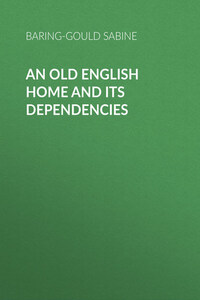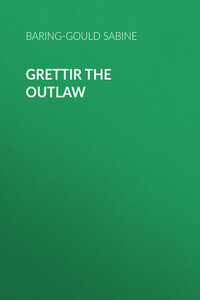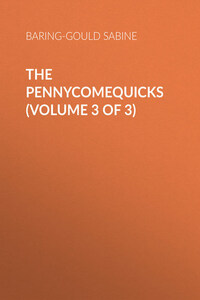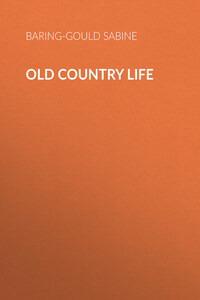There lives in my neighbourhood a venerable dame, in an old bacon box in a fallen cottage, whose condition will be best understood by the annexed illustration.
Fifteen years ago the house was in habitable condition, that is to say to such as are not particular. It was true that the thatched roof had given way in places; but the proprietress obtained shelter for her head by stuffing up the chimney of the bedroom fireplace with a sack filled with chaff, and pushing her bed to the hearth and sleeping with her head under the sack.
But access to this bedroom became difficult, as the stairs, exposed to rain, rotted, and she was compelled to ascend and descend by an improvised ladder.
After a while the ladder collapsed.
Then the old lady descended for good and all, and took up her abode on the ground floor – kitchen, and parlour, and dining-room, and bedroom all in one.
"And terr'ble warm and comfortable it be," said she, when the roof fell in bodily, and covered the floor overhead.
But when the walls were exposed, rain and frost told on them, and also on the beam ends sustaining the floor, and the next stage was that one side of the floor gave way wholly.
"Tes best as it be," said the old woman; "now the rain runs off more suant."
But in falling the floor blocked the fireplace and the doorway. The consequences are – now we come to the present condition of affairs – that the old lady has had to do without a fire for certainly three winters, amongst others that bitter one of 1893-4, and her only means of egress and ingress is through the window. Of that not one half of the panes are whole; the gaps are stopped with rags.
And now the floor is rotted through overhead by the mouldering thatch that covers it in part, and the rain drips through.1
Accordingly my lady has taken refuge in an old chest, and keeps the lid up with a brick.
"Tes terr'ble cosy," says she.
Last year, having a Scottish gentleman staying with me, I took him over to call on "Marianne." We had a long interview. As we left, he turned to me with a look of dismay and said, "Good heavens! in the wildest parts of the Highlands such a thing would be impossible – and in England!" – he did not finish the sentence.
I went back to Marianne and said, "Now, tell me why you will go on living in this ruin?"
"My dear," said she, "us landed proprietors must hold on to our houses and acres. Tes a thing o' principle."
There is perhaps a margin of exaggeration in this – in speaking of acres, as I believe the said estate spreads over hardly a quarter of an acre.
How was it, and how were similar little properties acquired?
By squatting.
Formerly there was a considerable amount of common land, on which the peasants turned out their asses and geese. Then some adventuresome man, who took a wife and had no house into which to put her, annexed a piece of the common, just enough for a cottage and a garden, and none said him Nay. There was still plenty for all, and so, in time, it became his own, and was lost to the rest of the parishioners. Little by little the commons were thus encroached upon. Then, again, formerly there was much open ground by the sides of the roads. Cattle were driven along the highways often for great distances, and the turf and open spaces by the sides of the roads were provision made for their needs.
But squatters took portions of this open ground, enclosed, and built on it. There was no one to object. The lord of the manor might have done so, but he was a little doubtful as to his right to forbid this annexation of ground on the side of the highway, and he and the parishioners generally agreed to let be. It might save the man coming on the rates if he had a garden and house – no harm was done. There was still plenty of food for the flocks and herds driven along. So we find thousands and tens of thousands of these cottages thus planted by the roadsides, with their gardens – all appropriations by squatters.
A curious thing happened to me when I was Rector of East Mersey in Essex. At the edge of the Marshes were a couple of cottages near a copious spring of limpid water. They had been built, and a tract of garden enclosed, some two hundred years ago, and occupied, rent free, by the descendants of the original appropriator. During my tenure of the rectory, the last representatives left, in fact abandoned the tenements. The Rector was lord of the manor. Accordingly these cottages, in very bad repair, fell to me, and I suddenly found myself responsible for them. Should I leave I could be come upon for dilapidations, and it would have cost me something like three hundred pounds to put these houses to right, from which I had not received a penny. Moreover, when rebuilt, no one would have rented them, so aguish and unhealthy was the spot. Accordingly I had to obtain, at some cost, a faculty to enable me to pull them down.
Some years ago Mr. Greenwood drew attention to the "North Devon Savages." These were squatters, or rather descendants of squatters, who held a piece of land and occupied a ruinous habitation, and lived in a primitive condition as to clothing and matrimonial arrangements.














